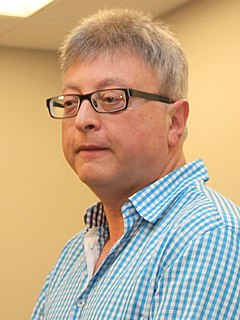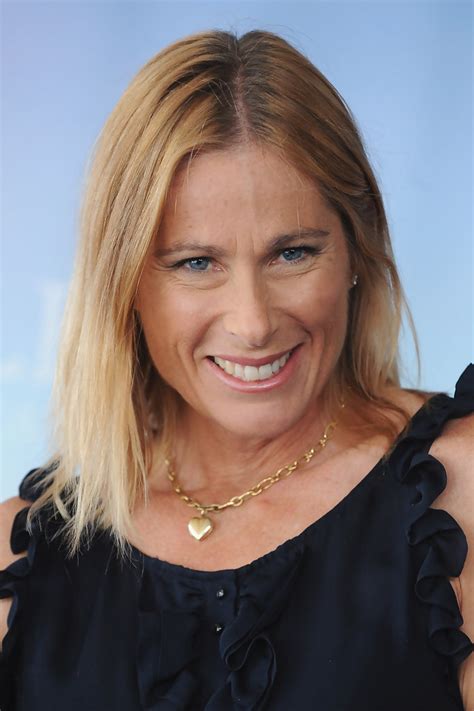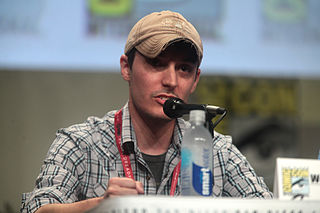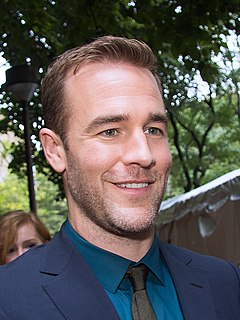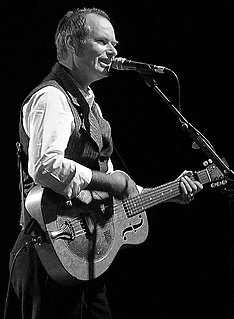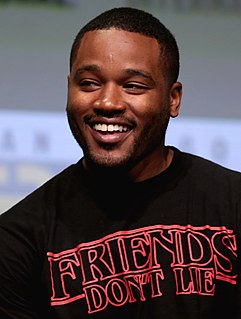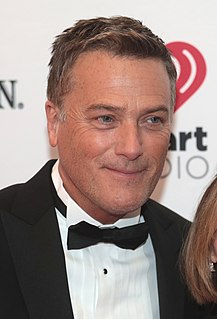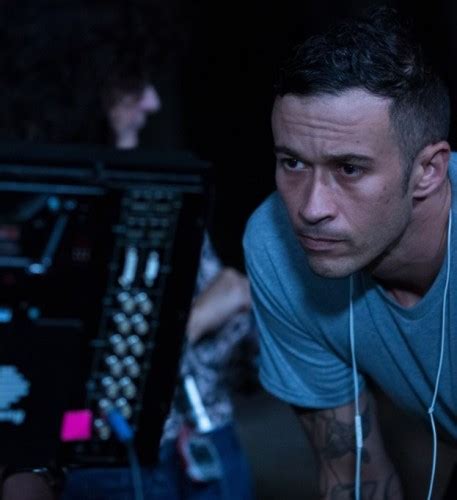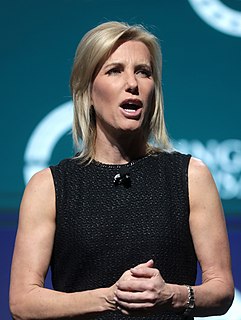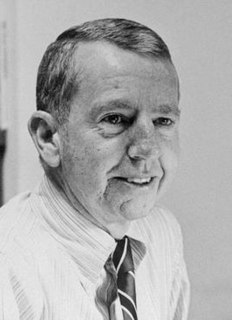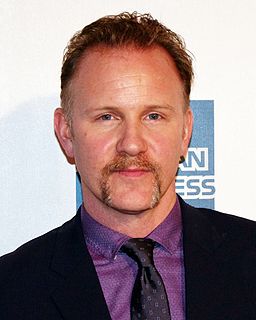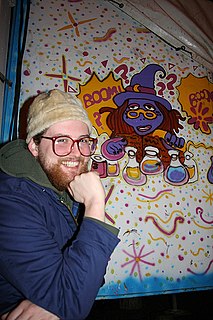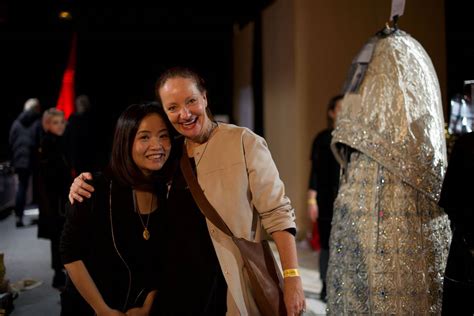Top 1152 Filmmaker Quotes & Sayings - Page 19
Explore popular Filmmaker quotes.
Last updated on December 22, 2024.
I usually try to connect with young filmmakers over the phone so I can hear them and just pick their brain as to why they want to tell the story. And usually, I'm on board. I go, "Yeah, I'd love to help. And I just need to know why you want to do this,' and it's usually an easy process because a filmmaker usually reveals his or her heart in telling the story. And that's why I'm pretty much of a softy when it comes to helping along the young ones along the way.
In polite society, there is such a thing as sensitivity to some issues, as time has gone on. There was a time when we weren't politically correct, at all, and we all wince at moments when we look to the past and see that. I don't really know what the answer is, as far as that is concerned. However, me, as an artist, I don't really think about it, at all. It actually is not my job to think about that, especially in terms of me, as a writer, but also as a filmmaker. I'm not worried about the filmmaking part because, if I'm writing it, that's what I'm going to do.
I think every filmmaker makes different choices. I remember in the early days, in some of the early comic book movies, certain white dissolves were used that would try to emulate the look and feel of comic book panel borders. Sometimes they would frame shots in panels or circles that gave it a real comic book feel.
Is there deeply embedded change within our industry? And I would say, as a black filmmaker, it's easy for me to focus my attention on black work, but true change would include brown work, and it would include work by Asian-Americans, and it would include natives, and it would include women, and it would include more LGBTQ voices.
I love making films, and as long as I love the subject, I just have a crazy amount of passion and energy for the project. The project that influenced me the most is this cooking show I do online. I film it all myself, and I think making so many of those gave me the confidence that all I need is a camera, and I could go and do an interview. The freedom to be a filmmaker - you just need a camera.
I applied [to film school] figuring, "I need to find some structure for myself. I need to find a way to figure out what kind of filmmaker I want to be." And that is what film school provides you with. It'll teach you the basics of how a production works and the technical side of how to put everything together, but you could also learn that by working on film sets.
Even if you make a movie about a criminal locked up in prison, you may not support him as a criminal, but you have to like him on some level. You have to love your protagonist and respect him. He will only open his heart to you when he believes that you are treating him with respect, with love. Only then will there be no more walls between the filmmaker and the protagonist.
If you're not connected emotionally to a story, then you're dead. You're as a filmmaker really just opening the door for people to lose interest and their minds to wander, for them to start picking it apart. That's what people will do, people will naturally tear stuff apart because they're trapped with it, they paid money for it. And they came into it wanting to love it. So all you can really do is piss off the audience. Unless you do things right.
Whatever experimental film aromas cloaked my movies were because I'm a gleefully clumsy, primitive filmmaker. I really like traditional pleasingly narrative films, but I also just couldn't resist throwing in the disruptive. It seems to me that art-house film is at its glorious zenith right now, maybe it can even get better? There's just so many good films, you know Cemetery Of Splendour, Arabian Nights, Miguel Gomes, just so much great work coming out.
I was making commercials. That's how I learned the craft. That was the marketing part of it: directing commercial for TV. It wasn't the most common thing to become a filmmaker in Greece. I started by saying I was interested in marketing and have a proper job in advertising and commercials. Basically, I studied film to learn how to do marketing, and commercials. As I studied film I learned I'd be interested in making films instead of commercials.
In the most basic terms it was about how when we experience art without critical awareness we consent to the ideas being promoted, either intentionally or unintentionally, by the filmmaker. For instance, if you watch a racist comedian and laugh at his jokes, you are consenting to the prejudices inherent within them. Similarly, if you watch a movie which perpetuates conventional ideas about race, gender, etc., you are consenting to them and not affecting change in any way.
When you're out there trying to still figure things out, it can just slow things down. So you have to kind of think on your feet, and it makes it kind of fun and exciting and challenging at the same time. But more time is always better for any movie. I think any director would probably tell you that. Any filmmaker, really.
Speaking personally as a filmmaker, I think encoded in Bond are a series of values about Britain, about the world, about masculinity, about power, about the empire that I don't share. Quite the reverse. Whereas in Bourne, I think encoded is much more scepticism. There's an us and a them, and Bourne is an us, whereas Bond is working for them.
As a young filmmaker, I shot a lot of stuff because I wanted to make sure that I got everything, but now I've gotten much more precise with my shooting. Editing is a whole other layer because then, sometimes you realize characters don't even need to say this or that. It becomes an issue of exposition, and over-explaining something. In the script, I'd reinforce certain things about what I wanted people to know two or three times, but in the editing room, I'd be like, "I only need to say this once, maybe twice."
I have a gut reaction to stuff that I read. Either it's a filmmaker that I really want to work with, or it's a story that I really want to be a part of and help serve, or there's a character that I feel I can bring something unique to. That's really what it's about. I would go crazy, if I just relied on the same tricks and did the same thing, all the time. It was just be no fun, at all. I really do need to try something different, every time out, and do something that scares me, a little bit.
I don't really distinguish between a fictional hero and a real life hero as a basis for any comparison. To me, a hero is a hero. I like making pictures about people who have a personal mission in life or at least in the life of a story who start out with certain low expectations and then over achieve our highest expectations for them. That's the kind of character arc I love dabbling in as a director, as a filmmaker.
Collaborations work when both or however many parties are the right people to be working together for whatever reason - whether it's two musicians or a musician and a filmmaker or a musician and a choreographer, if the combination is right, the possibility exists to make something greater than the individuals could make. But if the combination is wrong than you generally end up with a compromised piece is probably less than the individuals could make.
What I react against in other people's work, as a filmgoer, is when I see something in a movie that I feel is supposed to make me feel emotional, but I don't believe the filmmaker shares that emotion. They just think the audience will. And I think you can feel that separation. So any time I find myself writing something that I don't really respond to, but I'm telling myself, 'Oh yes, but the audience is going to like this,' then I know I'm on the wrong track and I just throw it out.
I'm always intrigued by new challenges and things that I've never done before and new experiences. It sounds so simple, but the primary interest is just something that's good and instills within me some kind of gut feeling that feels like something that I'm passionate and excited about, and there can be multiple variables that can instill that. It can be simply a filmmaker, it can just be a character, it can just be the script, or a combination of all those things. But, I'm always just looking to do things that I've never done before, primarily.
When industry people see something different they don't know what to do with it, so filmmakers who make films about women, they kind of fall through the cracks. If a woman filmmaker makes film about war, like [Kathryn] Bigelow, they say "Okay, this is a war film, it has ninety percent men in it, we know what to do with it." But then she still gets attacked for not doing it properly. [...] But even though it bothers me I don't want to dwell on the sex and gender thing.
Before I published my first book, I worked for a while as a documentary and wedding/bar mitzvah videographer, and a part of me still mourns the lost filmmaker I'll never be. Working on a documentary is nearly the opposite artistic process to writing: as a writer you are always trying to fill out a world to fit your story, but as a documentarian your work is to carve a story out of the world. Sometimes, when I'm feeling particularly blocked at my computer, I miss the days when I could just point my camera at something interesting and wait to see what happens.
As a filmmaker‚ like any artist‚ when something affects me emotionally I think about it in those terms. It's my way of dealing with my thoughts‚ my fears and my hardships. I think the same can be said with any artist. For a musician‚ you're going to write a song about something that affects you emotionally.
I've ended up as a filmmaker who really loves the movie part of movies. That time in my life was a big influence on the kind of movies that I ended up making. I always think I'm going to make a movie that's gritty and real, but then I make a movie that's like an opera. I fight it at first and then that's just the way it is.
I'm completely surrounded, not only my father, but also my three brothers, and Sergio, my husband, all four of them work in film. Some are writers, or directors, or cinematographers, all of them. I'm surrounded by men that make films, so much that at some point I felt there was no more room in the family for another filmmaker.For many years I was only working as novelist or writing screenplays for others to direct.
Tupac Shakur is something that, of course I want to make the Tupac movie, I love Tupac, but when that movie was announced, we didn't even have a script yet. It was just being written. People announce things too soon. If you go to any filmmaker - Clint Eastwood, Oliver Stone, Martin Scorsese, Ben Affleck, Michael Mann - you go in their offices and there are scripts everywhere and there's about four or five of them you really want to make.
I make films that are very personal, and I always have. It's kind of the only thing that I think I have to offer as a filmmaker: the intimacy I've had with experience in a particular world, so the film comes from things I've seen and things I've felt. It gets transformed by the process. I don't think I'd ever start making a film until I had both the intimacy with the subject and the distance to make it live in a certain way.
When I left university I was sure that I was going to be a painter. Then I had a crisis, a revelation. I saw Dolce Vita and my mind was blown by it, by the synthesis. I realised I wanted to be a filmmaker and started making films. I was writing screenplays and couldn't get money because my work was so uncommercial. I got married and started writing fiction. What was wonderful is that it gave me my freedom because no-one can tell me I can't work. Novels have become equally important to me as films. I consider myself a storyteller and passionately engaged in both of those disciplines.
I don't follow anything that's said about him much, but the Uwe Boll that I know is just a really cool guy. He's just a really quiet, kind and passionate filmmaker who really believes in what he's doing. Like any director that an actor wants to work with, you want a director who's passionate and believes in the work that he's doing.
When you go for something because you're curious about it, you get psyched up about the chance of getting into it. It's like an actor meets a role, and you slip into that body and see what happens, to experience certain conditions, to adopt a certain character. Even shooting is a study of the character. I think both the character and the actor, and eventually the filmmaker - myself - are finding a way to accept their environment and being accepted and feel comfortable of themselves.
You have to remain strong. That's the kind of filmmaker I want to encourage. Orson Welles was the one who said, you know, you can learn anything you need to know about filmmaking- that's camera, sound, celluloid, video at this point- in four hours. It has nothing to do with anything. It has nothing to do with it... It has to do with what you want to say. If you feel you have something to say, you'll find that way to get it said, on film, and not let anyone or anything chip away at that or tarnish it, because it's something special and precious.
I remember reading about police arresting this filmmaker making this freaky movie and his name was John Waters. And I was like, wow, someone in Baltimore is doing something creative? I didn't know there were people running off and making eight-millimeter movies. Then I got to New York and realized, oh, there's a whole world of people who do these things. I was utterly bored being in the suburbs, but I didn't know why I was bored.
I'm really passionate about the song Sky Spills Over. It was fun creating it in the studio and I've been overwhelmed at the response it gets when we perform it live every night. My son Ryan is a really talented filmmaker so I always enjoy working with him on a project. But what made this project even more special was that 3 of my own grandkids were in the video. This video was a lot of fun to make. I hope people enjoy it!
Even though it took forever to release a movie, and even though it's a small indie release, the fact that in five years someone will be skipping through Netflix, or Amazon, or whatever and say, "Wow, that was a really cool movie. That was a really great story. Or I was really creeped out, or intrigued by that." You almost kind of forget what it took to get there, or was it in the theaters or not. So that's kind of exciting as a filmmaker. That it doesn't really matter as much the release platform, as much as how can I see it?
I think there's been a gigantic shift in the way we talk to each other, and the way that we communicate with each other. So as a filmmaker, the stuff's always been really interesting to me, and I sort of considered a lot of my films horror films, the ones that were relationship dramas, because I feel like it was very easy to look at modern communication and the Internet and cell phones and all that stuff as horror movies, basically.
I've been joking that if Madonna taught us anything, you've got to reinvent yourself. I think it's important as a filmmaker, as any person working in the arts, that you've got to try new stuff and challenge yourself and take chances. I've tried to take a chance with every film I've done - I've never done it the easy way, and I think that's because that's what excites me, is making as big a mountain as I can in front of me, and just trying to mount it.
I want viewers want to talk about The Conquest. I want the dialogue to start after the movie. The cinema is there to leave a trace. I hope my film leaves a trace and that it will open a door for French cinema and that tomorrow other directors will make political movies. The job of a filmmaker today is to talk about the world surrounding him and, through his movies, to both entertain and raise questions about modern society.
Any filmmaker, big directors, and I'm not dropping any names - I actually have couple names I want to say, but I will not - we have a ratio. Each thing you repeat, my ratio is one to four.Actually some people are ratio one to 34. I know couple directors, big directors, they are just shooting over and over.
Unnamed entertainment industry moguls are now telling the New York Times that they intend never to work with Mel Gibson again. After all, how dare Mel Gibson challenge the public by producing a film that spurs public discussion, that pushes the envelope, that takes an old story to a new level. How dare Mel Gibson follow his own passion as a filmmaker. How dare he make $20 million on the opening day box office!
3D is very exciting. I love it. I'm a complete convert. Everything for me, from now on, is 3D. I'm completely convinced it's the future of home entertainment, as well as cinema entertainment. I think it's a paradigm shift, in terms of cinema, and those things don't happen very often. The introduction of sound, the introduction of color photography and now 3D have been the big shifts. They happen once every 40 or 50 years, so it's very exciting to be a filmmaker, working while one of them is happening.
If you want a film and they don't want you, sometimes you have to go fight for it. Sometimes that ends up just being a meeting really, just sitting down with them and just saying here is my vision for it and here is why I really love it. But for the most part, I think filmmakers gravitate towards people that are excited - as excited as they are about the film and as passionate about it. So sometimes going after it isn't so much a function of auditioning as it is just sitting down with the filmmaker.
I think every filmmaker in Europe would be lying if they didn't say one day they just wanted to make a movie here in Hollywood or at least try it. It's very different from European filmmaking, because here it's like a real industry. It's very much about money and making money, which I think is fine, because it's very expensive to make movies.
In this land of unlimited opportunity, a place where, to paraphrase Woody Allen, any man or woman can realize greatness as a patient or as a doctor, we have only one commercial American filmmaker who consistently speaks with his own voice. That is Woody Allen, gag writer, musician, humorist, philosopher, playwright, stand-up comic, film star, film writer and film director.
As a filmmaker, like any artist, when something affects me emotionally I think about it in those terms. It's my way of dealing with my thoughts, my fears and my hardships. I think the same can be said with any artist. For a musician, you're going to write a song about something that affects you emotionally.
It [moviemaking] is about entertaining audiences with great characters and great stories, you want to make people laugh, you want to make people cry, you want to have great music that is memorable. You want a movie that, as soon as it's over, you want to watch it again, just like that. That's what it is, whether it's live-action, animation, hand drawn, computer, special effects, puppet animation, it doesn't matter. That's the goal of a filmmaker.
One of my beliefs as a filmmaker is that if you can make somebody laugh, you can make them listen. With laughter, you can get somebody's guard down, you can open them up to listening to you. They don't feel like they're being preached to or talked down to. I think it helps, it makes really hard to understand information a little more accessible and palatable. And at the end of the day, it makes a movie a little more fun. It doesn't feel so heavy handed.
I often envy a filmmaker or a playwright or an author where people are like, "Yeah, I sat down every night and read your book and it was beautiful." Or, "Yeah, I went to the movies and all I did was watch the movie because that's all you could do at the movies." Where with music, it's like, "Ugh, I love your music. I listen to it while I'm jogging thinking about how I hate my body." But it is also the privilege of being a musician is you can have your music in this documented form and play it live and that's, I think, what draws me to it the most.
Orson Welles was a force of nature, who just came in and wiped the slate clean. And Citizen Kane is the greatest risk-taking of all time in film. I don’t think anything had even seen anything quite like it. The photography was also unlike anything we’d seen. The odd coldness of the filmmaker towards the character reflects his own egomania and power, and yet a powerful empathy for all of them--it’s very interesting. It still holds up, and it’s still shocking. It takes storytelling and throws it up in the air.
In Hitchcock's movies you can see the storyboards and that's cool. It's nice to see a filmmaker be that prepared. Most filmmakers today have their heads up their ass, they're not nearly that prepared. He obviously had a right to say this is what I want and this is how we're doing it, because he was ready. Some filmmakers show up on the set and they don't know what they're doing. So then everyone has ideas and that makes a bad situation too. Be a director who's completely in control and yet no one knows it.
I think that's true of all cinema, that's why cinema is the great humanistic art form. Whatever the film is, it doesn't matter what the film is about, or even whether it's a narrative or figurative film at all, it's an invitation to step into somebody else's shoes. Even if it's the filmmaker's shoes filming a landscape, you go into somebody else's shoes and you look out of their lens, you look out of their eyes and their imagination. That's what going to the pictures is all about.
We are fortunate to have such an esteemed filmmaker join the Marvel family. The talents Ryan [Coogler] showcased in his first two films easily made him our top choice to direct 'Black Panther.' Many fans have waited a long time to see Black Panther in his own film, and with Ryan we know we've found the perfect director to bring T'Challa's story to life.
It might sound crazy, but filming in a conflict zone, in Afghanistan, and being a female filmmaker was the easy part. I found people open and understanding of the importance and beauty of filmic storytelling. I never had to explain why Jake Bryant, my Director of Photography, and I were climbing up a ladder to get a high shot, or running ahead to get an arrival shot, or filming weeks after weeks, months after months, collecting so much material. The process was respected and honored.
I decided to be a filmmaker between my sophomore and junior years at Morehouse. Before I left for the summer of 1977, my advisor told me I really had to declare a major when I came back, because I'd used all my electives in my first two years. I went back to New York and I couldn't find a job. There were none to be had. And that previous Christmas someone gave me a Super-8 camera, so I just started to shoot stuff.
I guess what inspires me most is the desire to draw out feelings that feel best expressed on the written page by really good authors, and I'm not a really good author. I feel like my job as a filmmaker is to eff the ineffable, to take feelings that only poets could describe with words and try to project them on the screen for viewers to feel. I don't think I've succeeded once but in the act of trying I've come up with all these other results which sometimes intrigue me.


